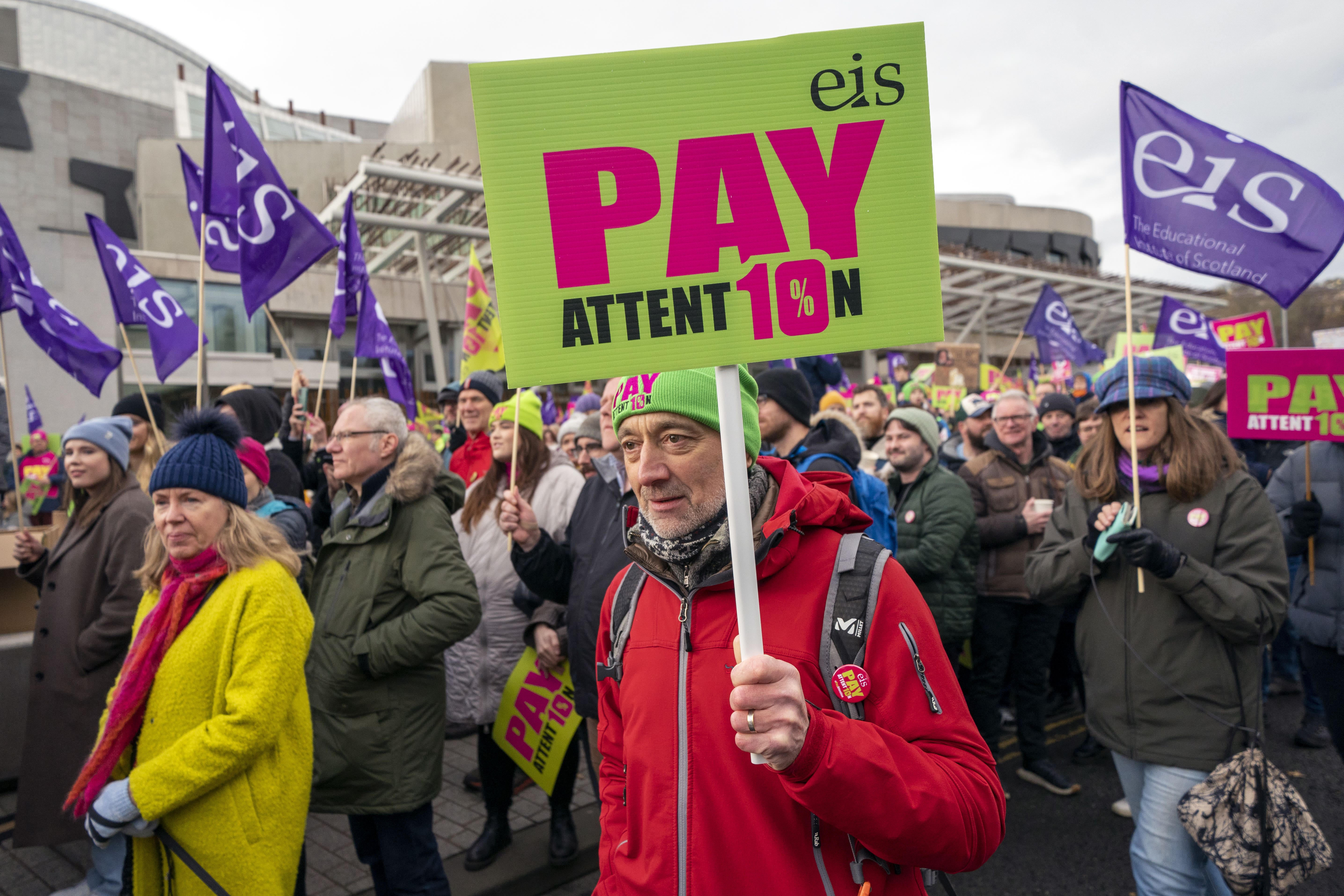Scotland teachers’ strikes to go ahead after last-minute talks fail to secure new deal
Meeting of Scottish Negotiating Committee for Teachers takes place in attempt to avert strikes

Your support helps us to tell the story
From reproductive rights to climate change to Big Tech, The Independent is on the ground when the story is developing. Whether it's investigating the financials of Elon Musk's pro-Trump PAC or producing our latest documentary, 'The A Word', which shines a light on the American women fighting for reproductive rights, we know how important it is to parse out the facts from the messaging.
At such a critical moment in US history, we need reporters on the ground. Your donation allows us to keep sending journalists to speak to both sides of the story.
The Independent is trusted by Americans across the entire political spectrum. And unlike many other quality news outlets, we choose not to lock Americans out of our reporting and analysis with paywalls. We believe quality journalism should be available to everyone, paid for by those who can afford it.
Your support makes all the difference.School pupils will miss lessons this week as teachers walk out after last-ditch talks between Scottish Government officials and teaching unions failed to prevent strike action.
Union members at Scottish primary schools will go on strike on Tuesday, with staff at secondary schools walking out the day after as teaching unions seek higher pay.
A meeting of the Scottish Negotiating Committee for Teachers (SNCT), which brings together unions, local authorities and the Scottish Government, took place on Monday in an attempt to avert the strikes.
Members of the Educational Institute of Scotland (EIS), NASUWT, Scottish Secondary Teachers’ Association (SSTA) and Association of Headteachers and Deputes in Scotland (AHDS) are now taking strike action.
SSTA and NASUWT members took two days of strike action in December while EIS members walked out on 24 November.
Discussions were previously held on Friday, which Scotland’s Education Secretary Shirley-Anne Somerville described as “constructive and helpful”.
She had previously urged union members to “reconsider their plans for industrial action while talks are ongoing”.
However unions said if there was no new offer then strike action would go ahead.
The current offer would see most staff in classrooms receive a 5 per cent pay rise, although the lowest-earning teachers would get a 6.85 per cent increase.
Unions have demanded a 10 per cent increase.
EIS general secretary Andrea Bradley said: “The SNCT negotiating meeting, held today following a request from teacher unions, did not result in any new pay offer from the Scottish Government and Cosla (Convention of Scottish Local Authorities).
“This means that strike action, planned for Tuesday in primary schools and for Wednesday in secondary schools, will proceed as scheduled.”
“It is disappointing, though not surprising, that no new offer was presented today, despite some positive progress in discussions.
“The union side remains willing to talk, at any time, with a view to reaching a resolution to this dispute.
“While it is now too late to halt this week’s strike action in schools, we hope that fresh talks may take place later this week to advance discussions towards an improved offer.
“Only a significantly improved offer from the Scottish Government and Cosla can bring an end to this dispute.”
A Scottish Government spokesman said the meeting provided a crucial opportunity to further discuss potential areas for agreement.
We value our teaching workforce and recognise the vital importance of an agreement on pay, but we cannot escape the unprecedented pressures facing Scotland's budget
“While there was a shared understanding that today’s talks were focused on examining options for compromise, rather than tabling a new offer, dialogue was constructive,” they said.
“The Scottish Government continues to urge teaching unions to reconsider their plans for industrial action while talks are ongoing.
“Strikes in our schools are in no-one’s interest – including for pupils, parents and carers who have already had to deal with significant disruption over the past three years.
“We value our teaching workforce and recognise the vital importance of an agreement on pay, but we cannot escape the unprecedented pressures facing Scotland’s budget.
“While we have been clear that a 10 per cent pay increase is unaffordable within the Scottish Government’s fixed budget, we remain absolutely committed to a fair and sustainable pay deal.”
Seumas Searson, general secretary of the SSTA, said: “Members are taking part in the strike this week to send a hard message to the employer and Scottish Government that teachers demand to be respected and receive a professional salary that will act to retain teachers in Scottish schools.
“The latest offer was quickly rejected by the teacher unions and was deliberately divisive and inadequate.
“This apparent show of contempt to teachers by this offer has hardened the resolve of members and forced the SSTA to take the strongest form of action.
“For many SSTA members this will be the first strike they will have taken part in, and this action will have caused a great deal of anxiety not only for themselves but for the pupils they teach.
“The SSTA can only apologise to the pupils and their parents who are stuck in the middle of a dispute that should have been resolved months ago.
“Teachers do not want to be taking strike action as they would rather be in school teaching.”